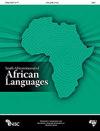公共空间中的语言可见性:津巴布韦马斯温戈的语言景观
IF 0.4
0 LANGUAGE & LINGUISTICS
引用次数: 0
摘要
本文从语言学景观的角度考察了津巴布韦马欣戈省公共空间的语言状况。这些数据包括显示在广告牌、路标和建筑物上的书面信息。数据也是通过深入访谈和文献研究产生的。这项研究的理论基础是建立在语言景观和后殖民理论之上的。这项研究确立了英语在城市景观和景观方面的压倒性优势。尽管津巴布韦主要土著语言之一绍纳语在少数情况下以专有名称的形式出现,但大多数当地语言并不是马欣戈道路、广告牌和建筑物上可见标志的一部分。这使英语成为唯一的官方语言,尽管津巴布韦宪法正式承认除英语外的15种土著语言。这种对土著语言的沉默对津巴布韦语言使用的公平性产生了严重影响。该研究建议在公共场所公平对待语言,以确保与津巴布韦所有语言相关的语言和文化不会逐渐消亡。本文章由计算机程序翻译,如有差异,请以英文原文为准。
Language visibility in the public space: the linguistic landscape of Masvingo, Zimbabwe
This article investigates the language situation in the public space in Masvingo Province, Zimbabwe, from a linguistic landscape point of view. The data consists of written information displayed on billboards, road signs and buildings. Data were also generated through in-depth interviews and documentary study. The theoretical underpinnings of the study are founded in the linguistic landscape and post-colonial theories. The study established the overwhelming dominance of English both in the cityscape and landscape. While Shona, one of the major indigenous languages of Zimbabwe, appears in a few instances in the form of proper names, most local languages are not part of the visible signs on roads, billboards and buildings in Masvingo. This gives English de facto status as the sole official language, regardless of the fact that the constitution of Zimbabwe officially recognises 15 indigenous languages in addition to English. This silencing of indigenous languages has serious implications for equity in language use in Zimbabwe. The study recommends equitable treatment of languages in the public space to ensure that the languages and cultures associated with all languages of Zimbabwe do not gradually die.
求助全文
通过发布文献求助,成功后即可免费获取论文全文。
去求助
来源期刊

South African Journal of African Languages
LANGUAGE & LINGUISTICS-
CiteScore
0.50
自引率
0.00%
发文量
30
期刊介绍:
The South African Journal of African Languages is a peer-reviewed research journal devoted to the advancement of African (Bantu) and Khoi-San languages and literatures. Papers, book reviews and polemic contributions of a scientific nature in any of the core areas of linguistics, both theoretical (e.g. syntax, phonology, semantics) and applied (e.g. sociolinguistic topics, language teaching, language policy), and literature, based on original research in the context of the African languages, are welcome. The journal is the official mouthpiece of the African Language Association of Southern Africa (ALASA), established in 1979.
 求助内容:
求助内容: 应助结果提醒方式:
应助结果提醒方式:


